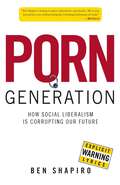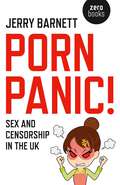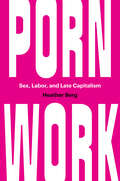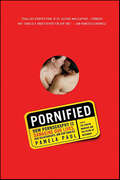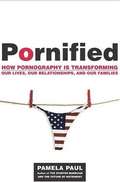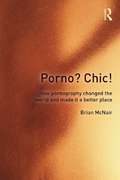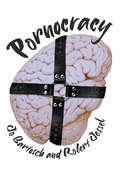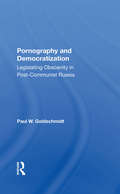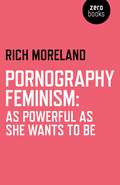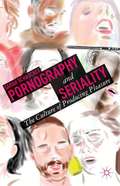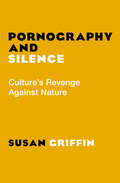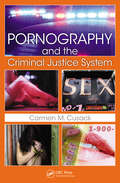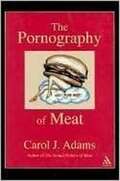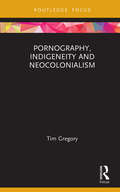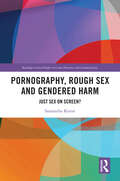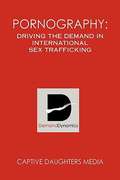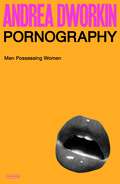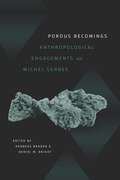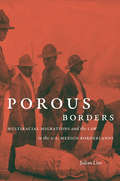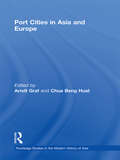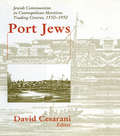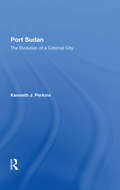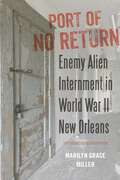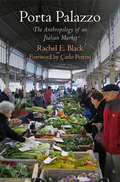- Table View
- List View
Porn Generation: How Social Liberalism Is Corrupting Our Future
by Ben ShapiroPorn Generation: How Social Liberalism Is Corrupting Our Future by Ben Shapiro
Porn Panic!: Sex and Censorship in the UK
by Jerry BarnettPorn Panic! charts the rise of a new social conservatism for the new millennium, coinciding with the collapse of liberalism as a political force. Unlike the old morality movements, this one is focused on the left of politics. Using the language of the old, liberal left - especially the feminist movement - the new conservatives have set out to rein in pornography, other sexual expression, and free speech in general.
Porn Work: Sex, Labor, and Late Capitalism
by Heather BergEvery porn scene is a record of people at work. But on-camera labor is only the beginning of the story. Porn Work takes readers behind the scenes to explore what porn performers think of their work and how they intervene to hack it. Blending extensive fieldwork with feminist and antiwork theorizing, Porn Work details entrepreneurial labor on the boundaries between pleasure and tedium. Rejecting any notion that sex work is an aberration from straight work, it reveals porn workers' creative strategies as prophetic of a working landscape in crisis. In the end, it looks to what porn has to tell us about what's wrong with work, and what it might look like to build something better.
Pornified: How Pornography Is Damaging Our Lives, Our Relationships, and Our Families
by Pamela Paul"Strips porn of its culture-war claptrap . . . Pornified may stand as a Kinsey Report for our time."—San Francisco ChroniclePorn in America is everywhere—not just in cybersex and Playboy but in popular video games, advice columns, and reality television shows, and on the bestseller lists. Even more striking, as porn has become affordable, accessible, and anonymous, it has become increasingly acceptable—and a big part of the personal lives of many men and women. In this controversial and critically acclaimed book, Pamela Paul argues that as porn becomes more pervasive, it is destroying our marriages and families as well as distorting our children's ideas of sex and sexuality. Based on more than one hundred interviews and a nationally representative poll, Pornified exposes how porn has infiltrated our lives, from the wife agonizing over the late-night hours her husband spends on porn Web sites to the parents stunned to learn their twelve-year-old son has seen a hardcore porn film. Pornified is an insightful, shocking, and important investigation into the costs and consequences of pornography for our families and our culture.
Pornified: How Pornography is Transforming Our Lives, Our Relationships, and Our Families
by Pamela PaulWhile most books about pornography examine it from a religious or spiritual nature, this book avoids that entirely. Instead, it examines the ways in which pornography negatively impacts the lives of users and those they love. The author asserts that the annonymity and ease of access to Internet pornography has changed lives and forced even the very young to deal with sexuality differently than at any other time in our history. She relies heavily on the results of a national poll which deals with the effects of pornography on the lives of those who use it.
Porno? Chic!: how pornography changed the world and made it a better place
by Brian McNairPorno? Chic! examines the relationship between the proliferation of pornography and sexualised culture in the West and social and cultural trends which have advanced the rights of women and homosexuals. Brian McNair addresses this relationship with an analysis of trends in sexualised culture since 2002 linked to a transnational analysis of change in sexual politics and sex/gender relations in a range of societies, from the sexually liberalised societies of advanced capitalism to those in which women and homosexuals remain tightly controlled by authoritarian, patriarchal regimes. In this accessible, jargon-free book, Brian McNair examines why those societies in which sexualised culture is the most liberalised and pervasive are also those in which the socio-economic and political rights of women and homosexuals have advanced the most.
Pornocracy
by Jo Bartosch Robert JesselThey say everybody uses porn. They’re wrong. People don’t use pornography: it uses us. And you don’t have to watch it to be one of its victims.In this thought-provoking and timely book, Jo Bartosch and Robert Jessel expose how the multi-billion-dollar pornography industry has humanity gripped in a chokehold. From rewiring our brains and normalising sexual violence, to shaping new protest movements, the pornographic revolution has achieved a stunning and near-total victory.The triumph of the pornocrats is made more sinister by society’s widespread acceptance that ‘all men watch porn’, the denial of its devastating harms, and a lack of political will to curb the power of the global pornography business.The authors answer the questions that politicians and policymakers are too scared to ask. Why, despite over half a century of feminist gains and lessons in schools on ‘consent’, do today’s school children display more sexist attitudes than their parents and grandparents? Do women really want to be choked and humiliated in bed? How can we fight back and reclaim sex, love and relationships?Drawing on the latest research, Pornocracy charts how the neurological shifts caused by porn use reverberate through society. The book also warns of a dystopian future where AI-powered porn and sextech threaten to reduce us all to masturbating meat puppets on an algorithmic production line.Provocative and powerful, Pornocracy tells the story of how pornography fundamentally changed—perhaps forever—what it is to be human.
Pornografía. El placer del poder
by Rosa Cobo«La pornografía es la pedagogía de la prostitución.» «El porno no es ficción, crea realidad.» Con esta obra, la feminista y académica Rosa Cobo relata una breve historia sobre los orígenes de la pornografía, al tiempo que pretende despertar conciencias y alertar sobre los efectos del consumo de pornografía, así como sobre su efectividad a la hora de construir un discurso y un imaginario de violencia misógino. Además, el libro también aspira a visibilizar y advertir sobre la relación directa que existe entre pornografía y prostitución.
Pornography And Democratization: Legislating Obscenity In Post-communist Russia
by Paul GoldschmidtExplores the politics of pornography and censorship in Russia today as a facet of the overall process of creating a liberal democracy in the Former Soviet Union. In this book, Paul Goldschmidt explores the politics of pornography in Russia today as a facet of the overall process of creating a liberal democracy in the Former Soviet Union. He clarifi
Pornography Feminism: As Powerful as She Wants to Be
by Rich MorelandDuring the sex wars of the 1980s, sex-positive feminism entered the adult film industry with a performer support group known as Club 90. Over the next three decades feminism found a home among an influential group of women in pornography. Pornography Feminism: As Powerful as She Wants to Be is a popular history of this unfolding saga told largely through personal interviews along with scholarly works, previous popular histories, and film reviews.
Pornography and Seriality: The Culture of Producing Pleasure
by Sarah SchaschekRepetition and seriality are inherent in pornography and is constitutive for its functionality as a film genre, an industry, and an area of gender studies. By linking the styles of the genre to processes of serial production, consumption, and discussion, Schaschek questions the dominant assumptions about pornography and the stability of the genre.
Pornography and Silence: Culture's Revenge Against Nature
by Susan GriffinA masterwork of feminist ideology, brilliantly exposing pornography as the antithesis of free expression and the enemy of liberty In this powerful and devastating critique, poet, philosopher, and feminist Susan Griffin exposes the inherent psychological horrors of pornography. Griffin argues that, rather than encouraging expression, pornographic images and the philosophies that support them actually stifle freedoms through the dehumanization, subjugation, and degradation of female subjects. The pornographic mindset, Griffin contends, is akin to racism in that it causes dangerous schisms in society and promotes sexual regression, fear, and hatred. This violent rift in Western culture is explored by examining the lives of six notable individuals across two centuries: Franz Marc, the Marquis de Sade, Kate Chopin, Lawrence Singleton, Anne Frank, and Marilyn Monroe. The result is an extraordinary new approach to evaluating sexual health and the parameters of erotic imagination. Griffin reveals pornography as "not a love of the life of the body, but a fear of bodily knowledge, and a desire to silence Eros."
Pornography and The Criminal Justice System
by Carmen M. CusackThis volume assembles hundreds of cases and studies to provide the most accurate and comprehensive picture of the status of pornography in the criminal justice system. Presenting high-level research in an accessible and organized manner, it explores a range of topics, including investigating and prosecuting a case, arguments favoring and opposing d
Pornography of Meat
by Carol J. AdamsHow does someone become a piece of meat?Carol J. Adams answers this question in this provocative book by finding hidden meanings in the culture around us. From advertisements to T-shirts, from billboards to menus, from matchbook covers to comics, images of women and animals are merged - with devastating consequences. <p><p> Like her groundbreaking The Sexual Politics of Meat, which has been published in two editions, The Pornography of Meat uncovers startling connections: Why pornography demonstrates such a fascination with slaughtering and hunting, Fixations on women's body parts expressed through ads for the breasts, legs, and thighs of chickens and turkeys, Animals to be eaten as meat presented in seductive poses and sexy clothing, Back-entry poses in pornography, implying that women - especially women of color - are like animals: insatiable, How meat advertising draws on X-rated images, Why at least one prominent animal-rights group is actually "in bed" with pornographers. <p><p> With 200 illustrations, this courageous and explosive book establishes why Adams's slide show, upon which The Pornography of Meat is based, is so popular on campuses across North America and is reviled by the groups she takes on with insight and passion. From the rise of chain steakhouses to the language of the hunt, from the halls of government to the practice of artificial insemination on farm animals, The Pornography of Meat shows exactly how harm to others parades as fun.
Pornography, Indigeneity and Neocolonialism (Focus on Global Gender and Sexuality)
by Tim GregoryPornography, Indigeneity and Neocolonialism examines how pornography operates as a representational system that authenticates settler colonies, focussing on American and Australian examples to reveal how pornography encodes whiteness, pleasure, colonisation and Indigeneity. This is the first text to use decolonial and queer theory to examine the role of pornography in America and Australia, as part of a network of neocolonial strategies that "naturalise" occupation. It is also the first study to focus on Indigenous people in pornography, providing a framework for understanding explicit representations of First Nations peoples. Pornography, Indigeneity and Neocolonialism defines the characteristics of heterosexual pornography in settler colonies, exposing how the landscape is presented as both exotic and domestic – a land of taboo pleasures that is tamed and occupied by and through white bodies. Examining the absence of Indigenous porn actors and arguing against the hypervisual fetishising of Black bodies that dominates racialised porn discourse, the book places this absence within the context of legal, political and military neocolonial Indigenous elimination strategies. This book will be of key interest to researchers and students studying porn studies, media and film studies, critical race studies and whiteness studies.
Pornography, Rough Sex and Gendered Harm: Just Sex on Screen? (Routledge Critical Studies in Crime, Diversity and Criminal Justice)
by Samantha KeeneExploring the nuances and complexities in men’s and women’s accounts of how mainstream pornography is experienced in their everyday lives, this book demonstrates how pornography can be both a site for pleasure and pain across gendered lines.Drawing on interviews with 24 heterosexual adults from Aotearoa New Zealand, the author provides insights into the various ways that men and women encounter, interpret, and are affected by the pornography that they, or their partners, view. It draws attention to the pleasures and pains of pornography for adult audiences, considering the impact of mainstream pornography on heterosexual relationships and sexual scripts, as well as gendered experiences of pornography “addiction”. Additionally, this volume examines the rise of “rough sex” and “choking” as a normalised sexual practice within heterosex. It interrogates what might be meant by “rough sex”, questions its normalisation, and highlights how portrayals of rough sex in online pornography may shape understandings of rough sex in offline sexual experiences. The findings affirm the need for a gendered lens that incorporates a harms-based approach to the study of mainstream pornography and its influence.Pornography, Rough Sex and Gendered Harm will be valuable to academics, researchers, students and activists who are interested in the pleasures and harms of mainstream pornography for adult audiences.
Pornography: Driving The Demand In International Sex Trafficking
by Captive Daughters MediaPornography: Driving the Demand in International Sex Trafficking
Pornography: Men Possessing Women
by Andrea DworkinAndrea Dworkin’s 1981 critique of pornography is an important and urgent document about how the culture consumes and manipulates images of women. Essential and discomfiting reading in a social media era, where women’s bodies are being commodified and displayed more than ever. Andrea Dworkin’s seminal 1981 work on the issue of pornography argues that the industry serves only to harm and oppress women. Her discussion of pornography as an outgrowth of the power that men exert over women—the power of owning, the power of money, and the power of sex, among others—still blazes with its clarity and immediacy, and illustrates how these inequities, while displayed in raw form in pornography, are endemic in all media.With a lively and deeply compelling voice, Andrea Dworkin succinctly outlines her anti-pornography stance. Though the media environment may have changed, this passionately and powerfully argued classic remains a relevant and crucial contribution to the area of feminist studies.
Porous Becomings: Anthropological Engagements with Michel Serres
by Andreas Bandak and Daniel M. KnightOne of the foremost intellectuals of his generation, French philosopher of science Michel Serres (1930–2019) broke free from disciplinary dogmas. His reflections on science, culture, technology, art, and religion have proved foundational to scholars across the humanities. The contributors to Porous Becomings bring the inspirational and enigmatic world of Serres to the attention of anthropology. Through ethnographic encounters as diverse as angels and religious conversion in Ethiopia, the percolation of war in Bosnia, and incarcerated bodies crossing the Atlantic, the contributors showcase how Serres’s interrogation of the fundamentals of human existence opens new pathways for anthropological knowledge. Proposing the notion of "porosity" to characterize permeability across boundaries of time, space, literary genre, and academic discipline, they draw on Serres to map the constellations that connect humans, time, technology, and planet Earth. The volume concludes with a conversation between the editors and Vibrant Matter author Jane Bennett.Contributors. Andreas Bandak, Jane Bennett, Tom Boylston, Steven D. Brown, Matei Candea, Alberto Corsín Jiménez, David Henig, Michael Jackson, Daniel M. Knight, Celia Lowe, Morten Nielsen, Stavroula Pipyrou, Elizabeth Povinelli, Andrew Shryock, Arpad Szakolczai
Porous Borders: Multiracial Migrations and the Law in the U.S.-Mexico Borderlands (The David J. Weber Series in the New Borderlands History)
by Julian LimWith the railroad's arrival in the late nineteenth century, immigrants of all colors rushed to the U.S.-Mexico borderlands, transforming the region into a booming international hub of economic and human activity. Following the stream of Mexican, Chinese, and African American migration, Julian Lim presents a fresh study of the multiracial intersections of the borderlands, where diverse peoples crossed multiple boundaries in search of new economic opportunities and social relations. However, as these migrants came together in ways that blurred and confounded elite expectations of racial order, both the United States and Mexico resorted to increasingly exclusionary immigration policies in order to make the multiracial populations of the borderlands less visible within the body politic, and to remove them from the boundaries of national identity altogether.Using a variety of English- and Spanish-language primary sources from both sides of the border, Lim reveals how a borderlands region that has traditionally been defined by Mexican-Anglo relations was in fact shaped by a diverse population that came together dynamically through work and play, in the streets and in homes, through war and marriage, and in the very act of crossing the border.
Port Cities in Asia and Europe (Routledge Studies in the Modern History of Asia #Vol. 54)
by Chua Beng Huat Arndt GrafWith the demise of European socialist economies and the marketization of Asian communist countries, a new global capitalism has reshaped the configuration of the world economy, with speed a determining factor to all transactions of information, finance, goods and services and people. Sea-ports that were significant for a slower but no less global economy have been undergoing transformation to stay economically and culturally relevant. Some manage to reinvent themselves as tourist cities, some face decline if they do not manage to transform. This volume looks at a number of port cities in Asia and Europe that face this pressure. With contributions considering history, contemporary developments, contacts between ports, the representation of ports and the relations between port cities and their hinterlands. This comparative study identifies many parallels between local histories and developments in the Asian and European port cities, as well as new opportunities for sharing experiences and learning from the developments and decisions in similar situations in other port cities.
Port Jews: Jewish Communities in Cosmopolitan Maritime Trading Centres, 1550-1950
by David CesaraniThe history of Jews in cosmopolitan maritime trading centres is a field of research that is reshaping our understanding of how Jews entered the modern world. These studies show that the utility of Jewish merchants in an era of European expansion was vital to their acculturation and assimilation.
Port Sudan: The Evolution Of A Colonial City
by Kenneth J PerkinsIn 1904, only the unimposing tomb of a local holy man occupied the site chosen by British officials for the construction of a modern seaport to facilitate the Anglo-Egyptian Sudan's expanded commerce. Built where no urban center had previously existed, Port Sudan was the quintessential colonial city, created and designed by Europeans, who organized its municipal services and devised the regulations for its day-to-day management. The advantages of a created city were clear: The colonial government did not need to accommodate an indigenous urban population with its own existing social structures, institutions, and cultural values. This study examines the efforts of Port Sudan's builders and early administrators to tailor the urban environment to their own notions of the ideal colonial city–how it should look, how it should function, and how its human components should interact. It then focuses on the inter-war period, describing how the rapid growth of Port Sudan and its harbor posed insurmountable challenges to the maintenance of this ideal. Although the Sudanese population within the city steadily increased, their exclusion from any meaningful participation in municipal affairs during these troubled years left them physically and psychologically isolated. The situation began to change after World War II, but, as the study reveals, conditions in the post-war era only compounded long-standing political, economic, and social problems in Port Sudan, ensuring that the city the Sudanese inherited in 1956 still bore the marks of its colonial origins.
Port of No Return: Enemy Alien Internment in World War II New Orleans
by Marilyn G. MillerWhile most people are aware of the World War II internment of thousands of Japanese citizens and residents of the United States, few know that Germans, Austrians, and Italians were also apprehended and held in internment camps under the terms of the Enemy Alien Control Program. Port of No Return tells the story of New Orleans’s key role in this complex secret operation through the lens of Camp Algiers, located just three miles from downtown New Orleans.Deemed to be one of two principal ports through which enemy aliens might enter the United States, New Orleans saw the arrival of thousands of Latin American detainees during the war years. Some were processed there by the Immigration and Naturalization Service before traveling on to other detention facilities, while others spent years imprisoned at Camp Algiers. In 1943, a contingent of Jewish refugees, some of them already survivors of concentration camps in Europe, were transferred to Camp Algiers in the wake of tensions at other internment sites that housed both refugees and Nazis. The presence of this group earned Camp Algiers the nickname “Camp of the Innocents.”Despite the sinister overtones of the “enemy alien” classification, most of those detained were civilians who possessed no criminal record and had escaped difficult economic or political situations in their countries of origin by finding a refuge in Latin America. While the deportees had been assured that their stay in the United States would be short, such was rarely the case. Few of those deported to the U.S. during World War II were able to return to their countries of residence, either because their businesses and properties had been confiscated or because their home governments rejected their requests for reentry. Some were even repatriated to their countries of origin, a possibility that horrified Jews and others who had suffered under the Nazis. Port of No Return tells the varied, fascinating stories of these internees and their lives in Camp Algiers.
Porta Palazzo
by Carlo Petrini Rachel E. BlackPorta Palazzo, arguably Western Europe's largest open-air market, is a central economic, social, and cultural hub for Italians and migrants in the city of Turin. Open-air markets like Porta Palazzo have existed for centuries in Europe; although their function has changed over time--traditional markets are no longer the primary place to buy food--they remain popular destinations. In an age of supermarkets and online commerce, markets offer unique social and cultural opportunities and bring together urban and rural worldviews. These factors are often overlooked in traditional economic studies of food distribution, but anthropologist Rachel E. Black contends that social relations are essential for building and maintaining valuable links between production and consumption.From the history of Porta Palazzo to the current growing pains of the market, this book concentrates on points where trade meets cultural identities and cuisine. Its detailed and perceptive portraits of the market bring into relief the lives of the vendors, shoppers, and passersby. Black's ethnography illuminates the daily work of market-going and the anxieties of shoppers as they navigate the market. It examines migration, the link between cuisine and cultural identity, culinary tourism, the connection between the farmers' market and the production of local food, and the urban planning issues negotiated by the city of Turin and market users during a recent renovation. This vibrant study, featuring a foreword by Slow Food Movement founder Carlo Petrini, makes a strong case for why markets like Porta Palazzo are critical for fostering culinary culture and social life in cities.
